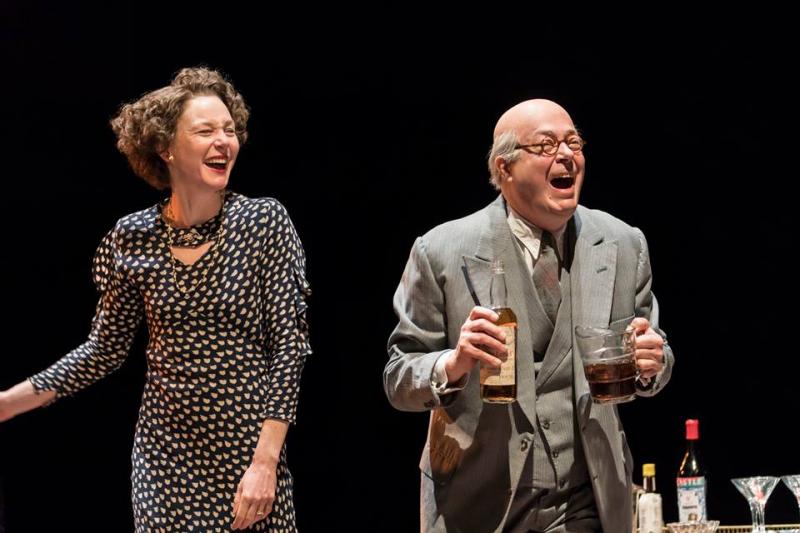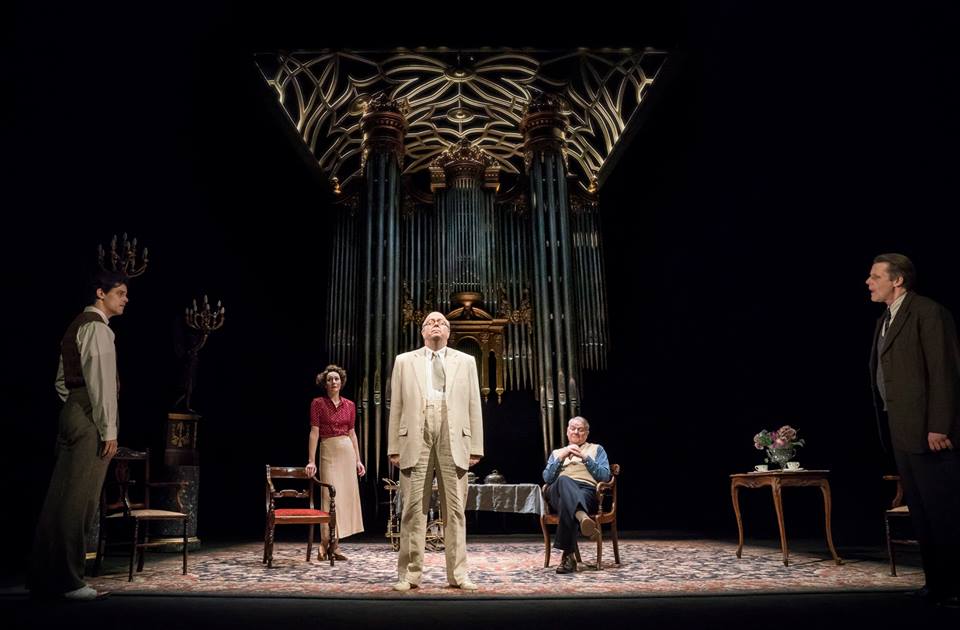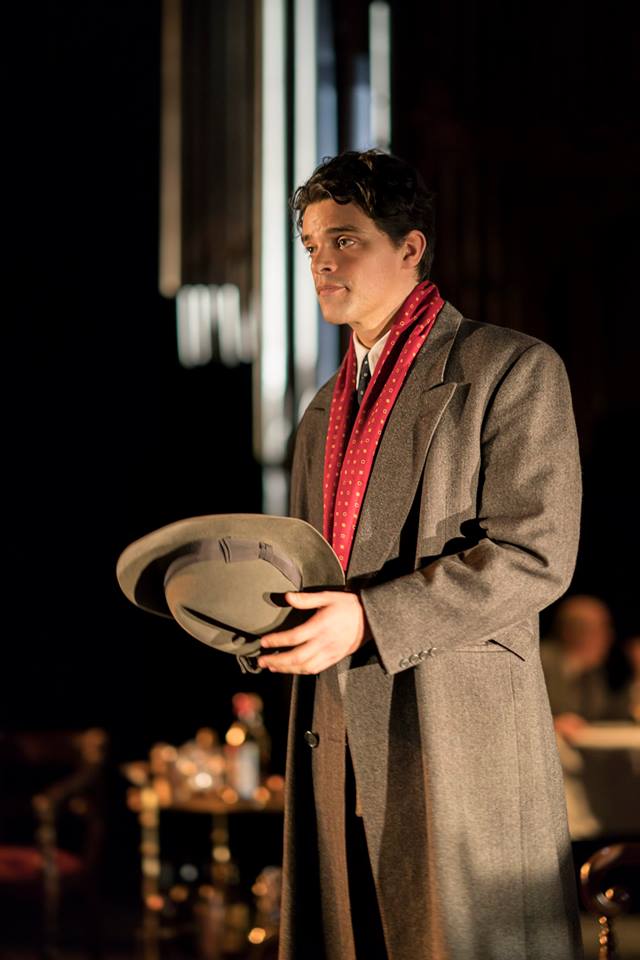The Moderate Soprano, Duke of York's Theatre review - love and opera with a flinty edge | reviews, news & interviews
The Moderate Soprano, Duke of York's Theatre review - love and opera with a flinty edge
The Moderate Soprano, Duke of York's Theatre review - love and opera with a flinty edge
Roger Allam and Nancy Carroll serve David Hare's iron fist in velvet glove to perfection

"What could be more serious than married life?" asked Richard Strauss, whose operas became a surprising pillar of Glyndebourne's repertoire some time after the early days dramatised in David Hare's play.
In a programme note as pithy as the lines he gives his characters, Hare points out that when he wrote the play in 2015, he had "no idea that a narrow vote in favour of Brexit was around the corner. But even then I wanted to celebrate a time when our country openly welcomed a migrant group, not just because of what we could give them, but because of what they might give us." The answer, in the case of Glyndebourne, is international opera at the very highest level, with superlative artists working in ideal circumstances (ask anyone who's performed there).
We see the slowness of privileged Brits to work out what's wrong in Nazi Germany, the time it takes World War One veteran Captain George Christie and his wife, the former Carl Rosa Opera Company soprano Audrey Mildmay, to be educated by the three great movers and shakers they welcome to their country house – conductor Busch, director (or "opera producer" as he was then known) Carl Ebert, and Ebert's Jewish Austrian assistant Rudolf Bing, who went on to run the Edinburgh Festival (Mildmay's idea, apparently) and the Met.  More rapidly established is the complex, loving relationship of Mildmay, the diplomatic power behind the Glyndebourne idea, and Christie, a seemingly confirmed bachelor of 48 when he met her and fell in love. So truly, deeply and beautifully do Nancy Carroll and Roger Allam nuance every line that it's hard to tell if the real magic comes from their performances or from what Hare gives them. He zigzags effectively through time, deftly sketching the disillusionments, compromises and pain, not least the devastating scenes in which the dying Audrey lashes out in agony at the ever-patient "Jack" – Carroll's greatest achievement lies here – as well as her crisp, patient younger self urging moderation from the impatient would-be impresario as they get to know the proponents of serious art.
More rapidly established is the complex, loving relationship of Mildmay, the diplomatic power behind the Glyndebourne idea, and Christie, a seemingly confirmed bachelor of 48 when he met her and fell in love. So truly, deeply and beautifully do Nancy Carroll and Roger Allam nuance every line that it's hard to tell if the real magic comes from their performances or from what Hare gives them. He zigzags effectively through time, deftly sketching the disillusionments, compromises and pain, not least the devastating scenes in which the dying Audrey lashes out in agony at the ever-patient "Jack" – Carroll's greatest achievement lies here – as well as her crisp, patient younger self urging moderation from the impatient would-be impresario as they get to know the proponents of serious art.
The accents of the "Germans" vary. It's true that Ebert was born of Polish and Irish-American parents - out of wedlock, as they say, just like Mildmay - but since he was brought up in Germany he should speak the language more idiomatically than the otherwise persuasive Anthony Calf does. Nor does Paul Jesson inflect his English as Jacob Fortune-Lloyd, a dashing young Bing (pictured below), does most successfully; but that hardly matters when the character is so strongly drawn. The scene of an incredulous but gentlemanly Busch's first meeting with Christie, who doesn't really grasp his stature, is deliciously done. It seems incredible that Christie really wanted a Festspielhaus for Wagner – to perform Parsifal with a string quartet and organ – rather than the jewel-box for Mozart the artistic team persuaded him was necessary; yet his naive enthusiasm for all things Germanic is charmingly etched. It's a nice touch, incidentally, that the very name of Mozart is postponed to dramatic effect until some way into the second act.
 It's a long path from the figurative and literal Lederhosen-wearer to the bleak, bereft Christie Allam conveys equally brilliantly towards the end of the play. The man's faults aren't avoided – the lord of the manor who wanted democracy, but only at his command; the taking-for-granted of his privilege (when telling his colleagues that a visa is being quickly sorted, Ebert announces "they all went to school together, they look after each other"); the bursts of inspiration that aren't backed up by hard graft. The point is that Christie needed Mildmay to plant his feet firmly on the ground, and his artistic triumvirate to work without compromise. Nor are the issues of opera for the privileged few sidestepped; it would be anachronistic to look forward to a time of easier access for everyone.
It's a long path from the figurative and literal Lederhosen-wearer to the bleak, bereft Christie Allam conveys equally brilliantly towards the end of the play. The man's faults aren't avoided – the lord of the manor who wanted democracy, but only at his command; the taking-for-granted of his privilege (when telling his colleagues that a visa is being quickly sorted, Ebert announces "they all went to school together, they look after each other"); the bursts of inspiration that aren't backed up by hard graft. The point is that Christie needed Mildmay to plant his feet firmly on the ground, and his artistic triumvirate to work without compromise. Nor are the issues of opera for the privileged few sidestepped; it would be anachronistic to look forward to a time of easier access for everyone.
When it comes to the "let's make an artwork" aspect, Hare does it better, and his team of actors execute it as a result more assuredly, less archly, than in any other play I've encountered grappling with such an issue. The Moderate Soprano is infinitely better than Farinelli and the King, Ronald Harwood's Furtwängler and Strauss plays, or Alan Bennett's The Habit of Art. True, there's a lot of back narrative to tell us what the exiles had faced in Germany, but Jesson has our hearts in our mouths when his Busch describes facing a jeering Dresden audience of Nazi officials and a silent orchestra with swastikas in their buttonholes. (I can't find that detail in Busch's excellent memoir, by the way, but it's the point at which the drama freezes us.)
I liked, too, the low and not too persistent level of music until the unfortunate end – a tinny blast of Mozart's Marriage of Figaro Overture with a huge cut in the middle – as well as Hare's lack of condescension in setting up the essentials. Would non-aficionados get it? I hope so, and cultural-capitalists may appreciate the gentler, more nostalgic aspects. Some have found the play too open-ended, but why not? The adventure of a bold beginning is what we always come back to here, for all the individual human failings and unhappinesses which followed. And under the pretty skin of Bob Crowley's handsome designs, beautifully lit as always by Paule Constable, there's a drama as tough and sometimes as cruel as the demands of the art-form it defines.
rating
Share this article
The future of Arts Journalism
You can stop theartsdesk.com closing!
We urgently need financing to survive. Our fundraising drive has thus far raised £49,000 but we need to reach £100,000 or we will be forced to close. Please contribute here: https://gofund.me/c3f6033d
And if you can forward this information to anyone who might assist, we’d be grateful.

Subscribe to theartsdesk.com
Thank you for continuing to read our work on theartsdesk.com. For unlimited access to every article in its entirety, including our archive of more than 15,000 pieces, we're asking for £5 per month or £40 per year. We feel it's a very good deal, and hope you do too.
To take a subscription now simply click here.
And if you're looking for that extra gift for a friend or family member, why not treat them to a theartsdesk.com gift subscription?
more Theatre
 Othello, Theatre Royal, Haymarket review - a surprising mix of stateliness and ironic humour
David Harewood and Toby Jones at odds
Othello, Theatre Royal, Haymarket review - a surprising mix of stateliness and ironic humour
David Harewood and Toby Jones at odds
 Macbeth, RSC, Stratford review - Glaswegian gangs and ghoulies prove gripping
Sam Heughan's Macbeth cannot quite find a home in a mobster pub
Macbeth, RSC, Stratford review - Glaswegian gangs and ghoulies prove gripping
Sam Heughan's Macbeth cannot quite find a home in a mobster pub
 The Line of Beauty, Almeida Theatre review - the 80s revisited in theatrically ravishing form
Alan Hollinghurst novel is cunningly filleted, very finely acted
The Line of Beauty, Almeida Theatre review - the 80s revisited in theatrically ravishing form
Alan Hollinghurst novel is cunningly filleted, very finely acted
 Wendy & Peter Pan, Barbican Theatre review - mixed bag of panto and comic play, turned up to 11
The RSC adaptation is aimed at children, though all will thrill to its spectacle
Wendy & Peter Pan, Barbican Theatre review - mixed bag of panto and comic play, turned up to 11
The RSC adaptation is aimed at children, though all will thrill to its spectacle
 Hedda, Orange Tree Theatre review - a monument reimagined, perhaps even improved
Scandinavian masterpiece transplanted into a London reeling from the ravages of war
Hedda, Orange Tree Theatre review - a monument reimagined, perhaps even improved
Scandinavian masterpiece transplanted into a London reeling from the ravages of war
 The Assembled Parties, Hampstead review - a rarity, a well-made play delivered straight
Witty but poignant tribute to the strength of family ties as all around disintegrates
The Assembled Parties, Hampstead review - a rarity, a well-made play delivered straight
Witty but poignant tribute to the strength of family ties as all around disintegrates
 Mary Page Marlowe, Old Vic review - a starry portrait of a splintered life
Tracy Letts's Off Broadway play makes a shimmeringly powerful London debut
Mary Page Marlowe, Old Vic review - a starry portrait of a splintered life
Tracy Letts's Off Broadway play makes a shimmeringly powerful London debut
 Little Brother, Soho Theatre review - light, bright but emotionally true
This Verity Bargate Award-winning dramedy is entertaining as well as thought provoking
Little Brother, Soho Theatre review - light, bright but emotionally true
This Verity Bargate Award-winning dramedy is entertaining as well as thought provoking
 The Unbelievers, Royal Court Theatre - grimly compelling, powerfully performed
Nick Payne's new play is amongst his best
The Unbelievers, Royal Court Theatre - grimly compelling, powerfully performed
Nick Payne's new play is amongst his best
 The Maids, Donmar Warehouse review - vibrant cast lost in a spectacular-looking fever dream
Kip Williams revises Genet, with little gained in the update except eye-popping visuals
The Maids, Donmar Warehouse review - vibrant cast lost in a spectacular-looking fever dream
Kip Williams revises Genet, with little gained in the update except eye-popping visuals
 Ragdoll, Jermyn Street Theatre review - compelling and emotionally truthful
Katherine Moar returns with a Patty Hearst-inspired follow up to her debut hit 'Farm Hall'
Ragdoll, Jermyn Street Theatre review - compelling and emotionally truthful
Katherine Moar returns with a Patty Hearst-inspired follow up to her debut hit 'Farm Hall'
 Troilus and Cressida, Globe Theatre review - a 'problem play' with added problems
Raucous and carnivalesque, but also ugly and incomprehensible
Troilus and Cressida, Globe Theatre review - a 'problem play' with added problems
Raucous and carnivalesque, but also ugly and incomprehensible

Add comment